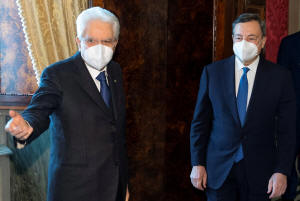Italy's president asks Draghi to form govt, parties hesitate
 Send a link to a friend
Send a link to a friend
 [February 03, 2021]
By Crispian Balmer and Giselda Vagnoni [February 03, 2021]
By Crispian Balmer and Giselda Vagnoni
ROME (Reuters) -Italian President Sergio
Mattarella asked former European Central Bank chief Mario Draghi on
Wednesday to form a government to tackle the twin coronavirus and
economic crises battering the country.
Draghi must now try and muster support in the fractured parliament, with
some political parties reluctant to back an administration led by a
technocrat.
Mattarella's move came after talks aimed at salvaging Prime Minister
Giuseppe Conte's shattered coalition collapsed leaving him with two
options - early elections or else a technocrat government to overcome
the many challenges facing Italy.
The president said national elections during the coronavirus pandemic
were unwise, and warned that a new administration had to take office
immediately or the country risked missing out on more than 200 billion
euros ($243 billion) from a European Union fund designed to help
overcome the economic slump.
However, there was no guarantee that the highly respected Draghi would
be able to muster sufficient support, with the largest party in
parliament, the anti-establishment 5-Star Movement, immediately ruling
out its backing.

Draghi is widely credited with pulling the euro zone back from the brink
of collapse in 2012, pledging to do "whatever it takes" to save the
single European currency.
He has largely vanished from the public eye since his ECB term ended in
October 2019, but his name emerged as a potential premier in recent
weeks as political turmoil combined with the health and economic
emergencies to form a perfect storm.
The first European country to be hit by the coronavirus, Italy has seen
more than 89,000 deaths since its outbreak almost a year ago - the
sixth-highest toll in the world.
Lockdowns aimed at curbing the contagion have devastated the economy and
data released on Tuesday showed that Italy's gross domestic product
shrank by 8.8% in 2020 - its steepest annual drop since World War Two.
Italy's 10-year bond yield fell sharply in early trade on Wednesday
touching the lowest level in almost two weeks. The closely watched gap
between Italian and German 10-year bond yields narrowed to 104 bps from
113 bps late Tuesday.
[to top of second column]
|

Former European Central Bank President Mario Draghi meets with
Italian President Sergio Mattarella at the Quirinale Palace in Rome,
Italy February 3, 2021. Francesco Ammendola/Presidential
Palace/Handout via REUTERS

LOOKING TO PARLIAMENT
The first challenge facing Draghi will be parliament.
The 5-Star, which has formed the backbone of Italy's last two
coalition governments, has repeatedly railed against the concept of
technocrat governments and would likely face a grass-roots revolt if
it backed the veteran central banker.
"The 5-Star would only have supported a government led by Giuseppe
Conte," said Riccardo Fraccaro, a party bigwig and government
undersecretary.
If the 5-Star remains on the sidelines, all eyes will be on the next
two largest parties - the centre-left Democratic Party (PD) and
far-right League - who are sworn political enemies but might have to
vote together to give Draghi a chance.
Asked whether his eurosceptic party would back the 73-year-old
economist, League leader Matteo Salvini said it would depend on his
plans. "He has to tell us what he intends to do," Salvini told
Italian daily Corriere della Sera.
One League source said the party would offer its support if it got a
commitment from Draghi to hold elections in a year.
The PD was largely supportive of Mattarella's move, but did not
offer unconditional backing. "The Democratic Party will have to
think about what to do in relation to what others are doing," said
PD deputy leader Andrea Orlando.
A Draghi government would reinforce Italy's international standing
at a time when it has the presidency of the G20. But taking the job
would carry risks for him.

The last time a technocrat took charge was in 2011, when another
economist, Mario Monti, was entrusted with helping Italy out of a
debt crisis. Parliamentarians soon turned on him when they deemed
that his economic medicine was too pungent.
(Additional reporting by Gavin Jones, Angelo Amante, Giuseppe Fonte
in Rome, Maria Pia Quaglia and Sara Rossi in Milan; Editing by Giles
Elgood)
[© 2021 Thomson Reuters. All rights
reserved.] Copyright 2021 Reuters. All rights reserved. This material may not be published,
broadcast, rewritten or redistributed.
Thompson Reuters is solely responsible for this content. |